From a "sponsor message" sent to me by the Chronicle of Higher Education "on behalf of Campus Management":
Institutions are facing a convergence of forces that, combined with an outdated technology infrastructure, have created the need for a new approach in education technology: the On Demand Model for Higher Education.
Discover the cornerstones of this innovative strategy, including how to enhance constituent engagement, provide more flexibility in academic delivery and financial aid, and leverage an agile infrastructure to grow and adapt in any market.
Hear from a panel of thought leaders as they discuss rising above technology challenges to empower dynamic models of engagement and delivery, and in turn positively impact growth, retention and financial security.
Read the rest of this entry »


